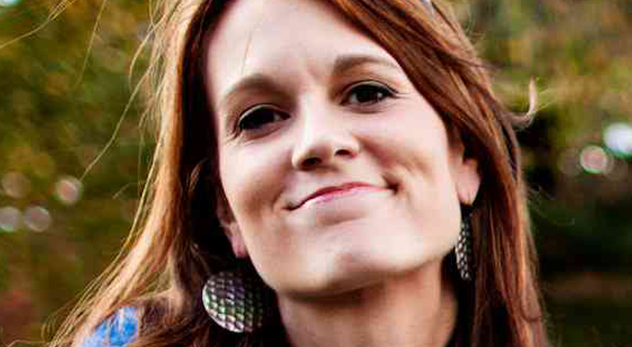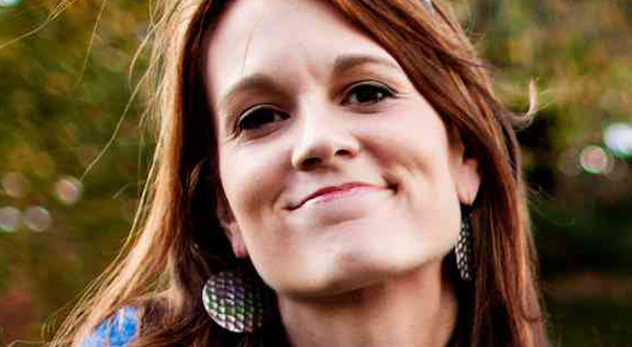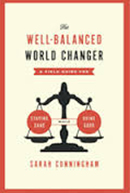
Those involved in ministry are prone to burnout, but author Sarah Cunningham says they can avoid it.
Anyone who’s every poured themselves into living out their faith, or championing a cause, has had to face the inevitable conflict between idealism and reality. I struggled with this tension years ago after finding myself disappointed with the way I felt many Christian churches in America were failing to communicate good news and effectively love their neighbors. In a bookstore one day, I stumbled across Dear Church: Letters from a Disillusioned Generation, which taught me that I was not alone and reminded me that God works through imperfect people and churches. In many ways, it restored my faith.
That was 2006, and the author of the book was a moonfaced and unknown writer named Sarah Cunningham. Since then, she’s continued to write to and for a generation of Christians who live at the nexus of idealism and reality. In her newest book, The Well-Balanced World Changer, Cunningham continues a conversation she’s been leading for some time addressing how to stay sane while serving God. Her book is relevant giving the uptick in socially-conscious do-gooders and recent statistics demonstrating the tendency for those in ministry to burnout. Here, we discuss how idealistic world-changers cant fight discouragement and sustain momentum in their work.
JM: In the beginning, no one thinks burnout will happen to them. So, when people start strong, pouring themselves out for others, what is it that threatens flourishing longevity?
SC: There’s a thousand different things that might threaten longevity, but almost all of them come down to a lack of awareness. When we’re moving too fast, or when we’re taking on too many or too big of projects that exceed our ability to emotionally manage them, we often choose to function in the rest of our lives at 60% or 80% of our energy and skill-level. We often walk around too tired or hyper-focused on just our primary cause, which dulls our own natural sense of intuition and can let us operate oblivious to the emotional warning signs stirring inside of us.
One story in The Well-Balanced World Changer explores how veteran leaders build awareness into their lives through a practice of pausing and assessing and recalibrating to their priorities. I think every leader who wants to be more than a flash in the pan, who wants to make it for the long haul, needs to establish some sort of rhythm of recalibrating along the way.
JM: And what are the red flags that leaders are losing momentum? What should they, or others, keep their eyes open for?
SC: [Laughs] So I actually list my own quirky red flags in the book because I think a lot of times the sign that our life is off balance isn’t some deep profound blaring siren going off, it’s the mess that creeps into the ordinary rituals.
For me, I notice imbalance in small, stupid things like my car gets really messy, my laundry piles up, toilets go uncleaned, it’s been too long since my last hair cut, I start letting most of my calls go to voicemail, I drink too much caffeine to sustain my pace. Okay, I think I’ll stop there. If readers want to learn more about what is involved in my leadership meltdowns, they’ll have to buy the book.
JM: Are there any leaders we’d know who’d begun to slide into burnout, but recovered?
SC: The answer is yes. For sure. Although a lot of times, I don’t think we’d know about it. Often times when the most intensely driven people do get sidelined by stress, anxiety, overworking and so on, they have a hard time being honest about it or reaching for help because they fear it may detract from their cause or make people lose faith in their vision.
A lot of times world-changers take on huge, systemic issues—they want to change the way faith is practiced in their community, they want to fight for the rights of minorities in our culture, they want to get every orphan adopted and so on. All worthy, worthy causes. But the challenge with any cause like this, of course, is the needs are endless. You feed one homeless person or help a homeless person feed himself, and there is another homeless person right behind him that also needs help. We can often pour out all our energy and decades of our lives and still feel like we don’t make a dent.
One story in The Well-Balanced World Changer gets at this exact trickyness, at how Jesus—the actual Savior, mind you—didn’t run door-to-door, knocking and asking “Does anyone here need to be healed?” How when he went to the pool of Bethesda where the sick gathered and we only have a record of him healing one person. He didn’t seem to have an agenda to personally resolve every need present in his community. His goal was to spread good news, to preach hope and he responded to those who called out to him along the way. So many times in life, I have tried to do more than even Jesus tried to do when he was on earth. I’ve tried to unearth and solve every need on my own and I’ve exhausted myself doing it.
JM: Okay, dish—because we really want to know—what has this looked like in your journey?
SC: Other than my piles of laundry you mean?
I am a very passionate and driven person. And a lot of times, especially in my younger years but on off days now too, I can convince myself I am able to take on a humongous goal because I have the right skill sets. I know how to break down a huge task into manageable pieces, I know how to make to-do lists, I know how to delegate, and so on. I’ve bit off more than I could emotionally manage more than once. And in those moments, I don’t like the shadow side of my leadership—the side that is venting relentlessly, that gets cynical, that has tens tons of emotion a millimeter below my surface just waiting to explode.
But what I’ve learned—and what I explain more in the book—is when I am tempted to take on a huge task, instead of asking “Can I do this?,” I am better served to ask myself, “Can I do this and still stay healthy?”
That’s an important difference. Sure, any joker might be able to workaholic themselves into succeeding if they’re willing to throw away their health, their spirituality, their friendships, their family and so on. But is that really impressive if the win comes at that kind of price?
Anyways, I’ve screwed up along the way. A lot of the wisdom I collected in this book I came by through making my own mistakes or having people who were smarter and healthier than me speak into my life. But I’m trying to believe in my dreams and to be courageous enough to take on big tasks but also smart enough to know my limits.
JM: What’s the most important idea/strategy that leaders need to maintain health and balance?
SC: I’m going to dance around this question a little. Like I mentioned earlier, I think awareness and re-calibration are key. But no matter what principle I answered you with here, and no matter what “wise insight” I laid down for readers, the truth is I would eventually fail to practice it in my own life and readers will probably not be foolproof at how they implement it either.
So maybe just as or more important is this, when you fail, God is not up in Heaven slamming a dead-end in front of you because you took a right where you should’ve taken a left.
I love the Biblical story of Abraham making a covenant with God in Genesis. In the book, I go into more detail about this, but if you pay attention, there is a point in the covenant where the two people making the oath typically walked through the pieces of the animals that were sacrificed (gross, I know, but that was then). The idea was that as you walked through, the two parties were symbolizing “If I break my word, then the loss of these animals’ lives, the blood shed here today, it is on me.” If you notice though, when Abraham and God make the covenant, Abraham falls asleep and sees God walk through the covenant in two forms–as fire and as smoke.
I think that picture says just about everything leaders need to know about God and how he relates to us. That he engages us as his people, but that when we fail to keep our part of the deal, he is there to help hold up our end of the bargain too.







